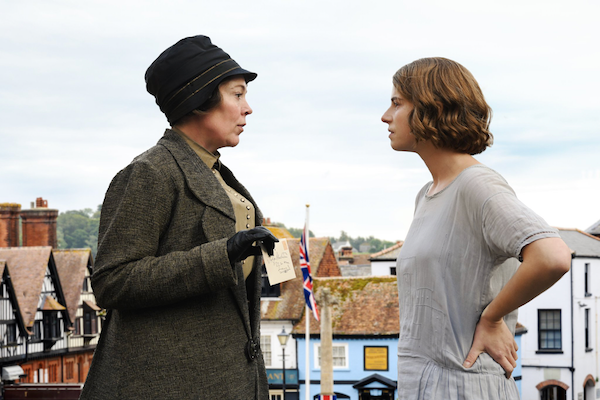Movie review by Greg Carlson
Nobody will mistake director Thea Sharrock’s undercooked “Wicked Little Letters” for Henri-Georges Clouzot’s 1943 “Le Corbeau.” Or, for that matter, Otto Preminger’s “Le Corbeau” remake “The 13th Letter” (1951). The poison pen concept has fueled many film plots, and this latest iteration at least has the good sense (or fortune) to feature first-rate performances by Jessie Buckley and Olivia Colman, along with a sturdy supporting cast. In 2021, Buckley and Colman played younger and older versions of the same character in Maggie Gyllenhaal’s adaptation of “The Lost Daughter.” Here, they are next door neighbors whose lives are upended by epistolary scandal.
Based loosely on the true events detailed in historian Christopher Hilliard’s 2017 book “The Littlehampton Libels: A Miscarriage of Justice and a Mystery About Words in 1920s England,” Sharrock’s movie condenses four criminal trials into a single courtroom showdown and a more streamlined melodrama that surely would have worked better as an incisive character study of either Colman’s put-upon, two-faced goody-goody Edith Swan or Buckley’s fire-breathing single mom Rose Gooding. Hilliard’s interest in the curious ways that working class people used profanity and the written English language at a time when “universal literacy was still a novelty” isn’t fully captured in the movie.
Regardless, “Wicked Little Letters” remains mostly enjoyable. But the conflict that drives the plot – a series of anonymous, handwritten notes charged with colorful expletives and sent through the post in a time when this would be taken very seriously – isn’t meaty enough to draw undivided attention from the viewer. Sharrock uses the period setting to comment on race and gender-based discrimination and suffocating patriarchal injustices, illuminated most directly via Gladys Moss, the suffering constable played by Anjana Vasan. The decision to reveal the “mystery” to the privileged viewer should be accompanied by a more thoughtful examination of Swan’s compulsion as well as the complicated relationship between Swan and Gooding.
Instead, Moss spends time cooking up an elaborate trap to incontrovertibly prove Gooding’s innocence despite the audience being miles ahead. We are left to imagine why Swan would threaten the freedom of Gooding beyond the breadcrumb trail left by the overbearing presence of Edith’s cruel father Edward (Timothy Spall). If Edith is using the letters to break free from or act out against Edward’s iron grip, perhaps to assert herself in the manner modeled by the candid and unapologetic Rose, Sharrock won’t say. Is Edith jealous of Rose’s independence and sexual liberty? Even if the answer is yes, the movie cannot account for Edith’s inhumanity beyond a near-fainting spell before the bench that implies she doesn’t have it all together.
The foul embarrassments, which include fun combinations like “foxy-ass old whore” and “aging, fucking, soft-cock streaks of hot horse piss,” are sure to get a rise out of any pious patrons and genteel ticket-buyers drawn in by a trailer promising such shocking verbal transgressions. Those epithets, along with gems like “piss-country old stinker with shit hair,” conjure smiles but cannot quite make up for the lack of development or understanding that fails to materialize between the two central figures. A more considered exploration of friendship, to the extent it could and did develop between these two seemingly opposite women, slips away.
